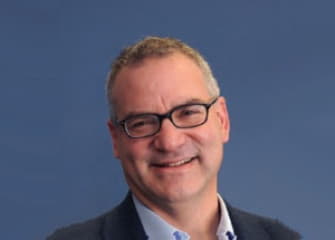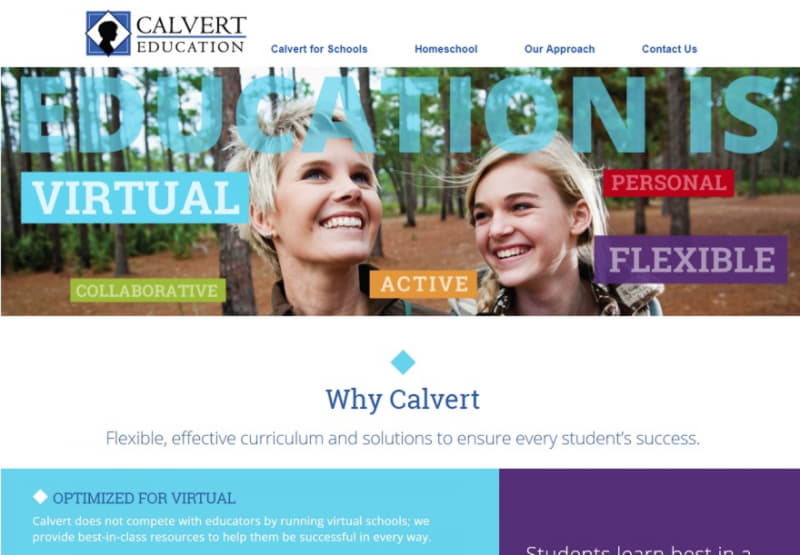
Steve Gross
Click here for Part I, Part II & Part IV
Offering a flexible education curriculum for K–12 students everywhere, backed by over a century of experience
Steve Gross is the CEO of Calvert Education Services. Founded in 1906 through the Calvert School of Baltimore, Calvert Education Services provides homeschooling, instructional support services, and virtual and distance learning programs for students in kindergarten through 12th grade. The company’s curriculum encompasses history, mathematics, reading, writing, arts, music, literature, science, social studies, geography, and many more enrichment courses. For this citybizlist interview, Steve spoke with David Warnock, the founder and CEO of Camden Partners, who also serves as Calvert Education Services’ chairman of the board.
DAVID WARNOCK: As a segue from the international business to what you’re doing in the public pay business in the U.S., talk a little bit about the relationship that you put together with—I think it was Beijing Limai and a school in Michigan, which I think is a model for some of the things that you’re likely to be doing in the future and is really value-added for kids in the U.S. and kids outside the U.S.
STEVE GROSS: Let me talk for a second about the evolution of our customer focus and then specifically talk about what you brought up there, David. When I joined, our primary focus was private pay. Private pay is consumer families around the world—but primarily in the United States, heavily concentrated in Maryland, but genuinely global business—in which consumer families pay us directly above and beyond whatever they pay in taxes or anything like that. This is a completely private transaction. What represents the future for us are schools, both domestically and internationally. Domestically, the fastest growing segment within the K–12 marketplace are virtual schools and blended schools—virtual schools driven by online learning. And fundamentally, it’s about learning outside the home with the assistance of teachers from the school, but importantly, it’s part of the school, so you’re not paying for it as a family. That is growing dramatically, and the segment of that that is growing particularly dramatically in recent years is the K–8 segment, which is our fundamental core strength. We are very focused on that domestically, selling to school districts and charter schools in that sector. That’s one. And then we also sell to international schools—led by our high school but we also sell K–8—those schools are typically international schools attended by locals from that country who find our American diploma an attractive differentiator to help them get into a United States university.
DAVID WARNOCK: So, in some ways, in the U.S., what you’re facilitating is the promise that all public schools should have access to online courses. There’s no reason why any public high school shouldn’t have access to Mandarin or advanced science, and they can do that with Calvert. They can do that with a kid taking Calvert in the walls of a physical classroom, or at home.
STEVE GROSS: I often travel to visit customers. Yesterday I visited a prospect in Duncansville, Pennsylvania. Duncansville, Pennsylvania—where is that? Well, guess what? That’s in the middle of Pennsylvania, and there is very little around it. They do have 178 students—that’s not nothing. They have 178 students, and that’s from the entire State of Pennsylvania. And also, to your point, their teachers can teach so much, but it’s only one school. Can we help them by providing teachers and subjects that you could never justify in a Duncansville, Pennsylvania? That’s a big part of what we do, and it’s a big part of the virtual promise of online learning. That is a big idea. I mean, that is a big idea. People criticize online learning—and you know, there’s ground that needs to be made up in terms of delivering the same kind of results via that mode of education as opposed to brick and mortar, there is ground to be made up—but, man, the promise is enormous. Even though we’re not the biggest player, we feel like, “Why not us to lead the way? Why not us?” We’ve just created a new curriculum and platform that we should probably talk about, but I feel like we’re well-suited to lead the way.
DAVID WARNOCK: Yeah. You’ve created a new curriculum in elementary school and middle school that’s getting rave reviews.
STEVE GROSS: We’ve created the first learning experience specifically designed for virtual and blended schools. There are curricula and platforms that are used in those environments, but they’re not designed for those environment.
DAVID WARNOCK: I hate to interrupt you, but what’s the difference between a virtual and a blended school?
STEVE GROSS: The term “blended” means a combination of online and physical instruction. Oftentimes, the line between a virtual school—or how one identifies oneself as a virtual school and a blended school—is blurry. It’s a spectrum. But a pure virtual school would be a pure online learning environment.
DAVID WARNOCK: Where the kid never sets foot in a public school building?
STEVE GROSS: Whatever school building, right. That’s not atypical because your school building may be hundreds of miles away. But then there are other environments where the school building is not hundreds of miles away, or maybe the online learning component may emanate from far away, but there might be learning centers nearby. That is typically what I call a blended school. Then there’s blended learning that happens in traditional schools, and that’s another way to think about it. There are more people who try to do that, although I think that’s something that we might be able to participate in as well. It’s a changing landscape, and as kids’ needs change, as families’ needs change, this is a really good answer for a lot of people. It can provide opportunities you could never have in a physical school. You have to think about it differently. That’s what we’re about. We have designed a learning experience for virtual that takes advantage of the fact that you’re not in a classroom. What can you do not in a classroom—that you can never do in a classroom—that enhances learning?
DAVID WARNOCK: And that can be advanced learning. We talk about advanced language and advanced math. But I think what Calvert did pro bono for Green Street Academy in the credit recovery area—so many school kids in our public schools are overage for the class that they’re in and they need to catch up. And the combination of that, plus summer learning loss—kids forgetting what they learned the year before—but specifically to the credit recovery, Calvert’s online capabilities have allowed kids in public schools to get the classes that they need to move on to the next grade, and to actually graduate on time, which is a profoundly important trend.
STEVE GROSS: Right. So, at Green Street, we’re doing a program that helps kids who are fighting hard to make it work, and helping them catch up, and it’s gratifying on multiple levels. I would also say, David, that the same thing could and should apply even more in elementary school levels too. For example, we have a product called Verticy. Verticy helps people who are struggling readers read better, and it’s proven, and it’s good. It need to be updated, but I’m thinking that really probably should be updated. The reality of it is if you address the kids in third grade, you don’t need credit recovery in 11 th grade. Is that opportunity for us to help schools and families? I think it is. We’re also using that liberally in our international market. So, there’s a number of different ways that we help schools and families.
Connect with Steve on LinkedIn


Edwin Warfield, CEO of citybizlist, conducts the CEO Interviews.
If you're interested in reaching CEOs, please contact edwin.warfield@citybuzz.co



































